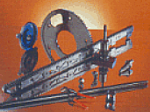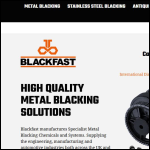- 60,000 contract/tender opportunities per year
- 4 Million UK Companies listed
- 12 million Director Names
- 100 million web pages indexed
Blackfast Chemicals Ltd
Overview
- Miss Jeanet Ostergaard - Director
- LINES, Anthony George - Director
- OSTERGAARD, Jeanet - Director
Products
Blackfast Chemicals is a specialist developer of surface treatment solutions for the metalworking industry, including iron and steel blacking solutions, antiquing solutions, degreasing solutions and powders, acid pickling solutions, alloy wheel strippers, dewatering oils, rust removers and paint strippers.
Our iron and steel blacking solutions are used throughout the metalworking industry to provide an even colour coating that does not alter the dimensions of the given component. They are particularly suitable for tight tolerance components where paint and plating processes are unsuitable. The uniform black finish that the process provides also adds considerably to the perceived value of the product, and the surface readily absorbs wax, oil or other sealants for greater corrosion resistance.
These are the reasons why Blackfast Chemicals are applied to such a wide range of products and components that includes hand tools, metal working equipment, tool holders and cutters, automotive parts, general industrial equipment and more.
Iron & Steel Blacking
The Blackfast metal blacking process is a chemical process used to colour iron and steel components black. This finishing process doesn’t affect the dimension of components in any way and also provides components with high-quality corrosion protection. The durable black finish of components not only enhances the appearance and value of parts, but also reduces glare, helping to improve operator handling and safety. If you are looking to transform your iron or steel components or would like to find out more about our blacking process, please get in touch.

Stainless Steel Blacking
The Blackfast surface conversion process is also used to transform stainless steel equipment. The process involves a number of steps:
- Degreasing for 15-20 minutes
- Water rinse for 30 seconds
- Acid pickling for 10-15 minutes
- Water rinse for 30 seconds
- Blackening for two minutes
- Water rinse for 30 seconds
- Dewatering for 10 minutes
The parts then need to be allowed to dry for at least 8 hours before being handled.
Please get in touch to find out more about our stainless steel blacking. All of our products are manufactured to incredibly high standards in line with stringent safety regulations.

Antiquing Solutions
Blackfast antiquing solutions are typically applied to furniture fittings, suitcase fittings, jewellery, mugs, clocks, coins, plates and badges to give greater aesthetic appeal. The process - which involves immersing the object in a 35-40 ° C bath of Blackfast solution for around 5 minutes - is used to darken bright brass, pewter, copper, nickel or silver surfaces, giving the appearance of long-term use without compromising the material’s natural properties. After immersion, the object is allowed to dry and then lightly abraded to remove coating on proud surfaces.
Follow the link to the Blackfast website to find out more.

Hydrogen Embrittlement
Hydrogen embrittlement is the process where metals become brittle and fracture as a direct result of contact with atomic or molecular hydrogen. Various metals can suffer hydrogen embrittlement, however, the hardness of the metal is key to understanding whether the process may be of concern. Generally speaking, if the hardness of the component is below 35 HRC, hydrogen embrittlement probably won’t be an issue, whereas metals with hardness ratings above 40 HRC are likely to suffer. Hydrogen embrittlement can occur during manufacturing and operational processes. Blackfast Chemicals offers a selection of products designed as a solution to hydrogen embrittlement. Please head to our website to find out more.

History of Blacking
Here at Blackfast, we are pleased to offer our unique metal blacking services. Metal blacking, or blueing, as has traditionally been the name known for the metal blacking process, has been around for many years. The process once involved oxidising the metal surface by dissolving copper nails in acid, immersing the item and then burying it in soil for a number of weeks to create the deep blue/black colour required. In recent years, this cold blacking process has been known as chemical blacking or chemiblacking. The hot oxide process is known as black oxidising or black oxide. Now, Blackfast is the name that has been increasing rapidly in popularity throughout Europe during the last ten years. Please read on and/or visit our website to find out more.

The Trouble with Nickel
Health concerns relating to nickel sulphate have been raised following recent research, however, it’s important to note that the research carried out by the Rapporteur (the Danish Environmental Agency) was based on nickel sulphate exposure in industries that use nickel sulphate on a major scale. The research revealed that exposure to nickel sulphate only occurs by inhalation of aerosols. As Blackfast 181 is not agitated, aerosols should not be produced. To find out more about nickel sulphate and to view current occupational exposure limits, please visit our website.

How to Use a Blackfast Line
The blacking process used by Blackfast is designed specifically for use in factories. It comprises a simple dip operation carried out at room temperature. A desirable finish is achieved, as the dimensions of the items being blacked are not seriously effected and the process produces a uniform colouring over machined surfaces, threads and blind holes and protection against corrosion. The process is in several parts and involves degreasing, immersion in a surface conditioner and blacking solution, followed by immersing the part in dewatering oil. We have outlined the full process in details, along with graphic diagrams, on our website.

Typical Applications
Typical applications for the use of the blacking process include: for machinery parts, such as tools, gears, clutch parts, transmissions and a great deal more. Blacking can be used for industrial machinery, such as printing, can making and cigarette making machines. When used for fasteners and other miscellaneous items, typical applications include springs, drill bits, jaws and cutting tools. Follow the link to our website to see the a full list of typical applications suitable for the blacking process.

Room Temperature Blacking Process
This involves a simple dip operation that is suitable for production plants and factories . The metal is degreased, immersed in a surface conditioner (Blackfast 551), and then immersed in the blacking solution (Blackfast 181). A final immersion in dewatering oil (for 15-20 minutes) further improves corrosion resistance. To view our diagram on how the process works, simply follow the link to the Blackfast website.

User Benefits
The main advantage of the blacking process over other surface finishing techniques is that it makes no dimensional changes on the component or product that it is applied to. This means it can be used to coat machined parts that are manufactured to extremely tight tolerances. A blackened surface also absorbs wax, oils or rust-preventative sealants for a corrosion resistant finish. Moreover, a uniform black finish also enhances the perceived value of the component. You can find out more about the advantages of the blacking process by visiting www.blackfast.com.

Environmental Benefits
The blacking process holds a number of environmental advantages over hot oxide methods:
- Blackfast can be used at room temperature – Hot oxide needs to be heated to 140°C. This means less energy is required in the blacking process.
- It allows safe and easy chemical addition - unlike hot oxide, which needs close control to avoid eruptions and spattering.
- Dipping baths are non-fuming, and therefore extraction is not necessary.
Visit us online to find out more about the environmental benefits of Blackfast.

Who Uses Blackfast?
Blackfast is used throughout the metal working industry for an even colour coating which does not alter the dimensions of the product/component. It is applied to hand tools like spanners, taps, dies, drills, sockets, pliers and wrenches, metal working equipment like lathes, grinders, punches, presses and cutters, general industrial equipment such as drives, clutches, transmissions, hydraulic blocks and fasteners, plus many other machinery parts, workholding devices and automotive components.

Distributors
Blackfast products are distributed in almost 40 countries across five different continents, meaning customers worldwide can benefit from the use of our surface treatment solutions. You can find a list of distributors on our website.
If you are interested in becoming a distributor of Blackfast chemical blacking and antiquing solutions, please get in touch. The market potential for our products is huge, and indeed we already count some of the world’s leading tooling manufacturers and OEMs amongst our customers.

Details
Info
| Registration Number: | 05368415 |
| VAT Number: | GB864 3952 91 |
| Registered at Companies House: | 17 February, 2005 (19 years and 2 months ago) |
| No of Employees: | 1-10 |
| Annual Turnover: | n/a |
| Importers: | |
| Exporters: | |
| Company Type: |
|
| UK Branches: | Surrey & Leicestershire |
Questions
Additional Information
Brand & Trade Names
- Blackfast
Products & Services
Gallery
Financial Information
To view more detailed financial information for this company click here.
- GRAYS
- Pitch Construction Ltd
- Footwear
- Just Noey Ltd
- Jds Mattos Consulting Ltd
- Total-tech (UK) Ltd
- Seismic Cable Installation Maintenance, Repair
- Engine Oil
- B2b Support Ltd
- Cascade Vending Machines
- Universal Joint Shaft Couplings
- DRO Oscillators
- BLUE RESPONSE SECURITY UK LTD
- Eling Construction (Southern) Ltd
- Khans Kebabs Ltd
- Castle Homes (Chesterfield) Ltd
- Ocean Lodge Ltd
- Label Planet Ltd
- Jamie Biggs Carpentry Specialist Ltd








